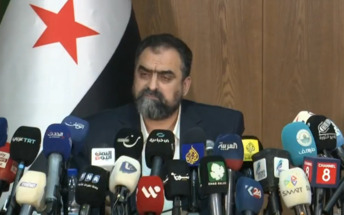-
Syrian Democratic Council Rejects Transitional Constitution and Considers it a Threat to the Country's Future
-
Considering Islamic Sharia as the main source of legislation in the new constitution raises concerns among minorities and reinforces challenges to building a political system inclusive of Syria's dive

The Syrian Democratic Council (SDC), the political wing of the Syrian Democratic Forces (SDF), launched a sharp attack on the constitutional declaration presented by the drafting committee to the Syrian Interim Transitional President Ahmad Al-Sharaa, describing it as "the most dangerous for Syria's future."
The council confirmed in a statement that "the Syrian constitution for the transitional period is illegitimate and inconsistent with the principles of democracy and pluralism, but rather reinforces hegemony and pushes the country toward chaos," emphasizing that the new constitutional document is "more dangerous than the Baath Party constitution, as it reproduces authoritarianism with a different facade."
The statement considered that the constitution "was prepared by only one faction, which is the Sunni Islamic faction, in a clear exclusion of the rest of the Syrian people's components," warning that "imposing Islamic Sharia as a main source of legislation undermines individual freedoms and makes citizens' rights restricted according to a specific intellectual vision."
The Syrian Democratic Council emphasized that "this constitution grants Syrians only the right to life, while they are stripped of their other basic rights, such as freedom of opinion, political participation, and equality among all citizens."
In a related context, the council told Sky News Arabia on Thursday that the Syrian Interim Transitional President Ahmad Al-Sharaa "is repeating what" former President Bashar al-Assad "used to do," adding that "the Syrian constitution for the transitional period is illegitimate and does not comply with the agreement between Al-Sharaa and the SDF commander." The council clarified that "highlighting Sharia in state administration takes the country toward chaos."
For its part, the Self-Administration joined the front of those rejecting the constitutional declaration, considering it "incompatible" with Syria's diversity and including articles similar to the Baath Party rule era.
The Self-Administration added that the declaration is devoid of "its various components from Kurds to even Arabs," indicating that it "includes articles and a traditional pattern similar to the standards and measures followed by the Baath government" that ruled the country for decades.
The drafting committee of the constitutional declaration in Syria had submitted, on Thursday, the draft declaration to the Syrian Interim Transitional President Ahmad Al-Sharaa. One of the committee members confirmed, during the handover ceremony at the People's Palace in Damascus, that "the declaration stipulates the rights of opinion and expression," adding "we maintained the requirement that Islamic jurisprudence is the main source of legislation."
The member continued: "The country will remain committed to human rights agreements it has signed... and emphasize the state's commitment to the unity of land and people," highlighting that "the transitional phase lasts 5 years... and Syria is committed to the independence of the judiciary and the complete separation of powers."
The committee member revealed that "the declaration of a state of emergency is controlled by the approval of the National Security Council and its extension is subject to the approval of the People's Council," adding: "The People's Council assumes the legislative process and the President of the Republic assumes the executive power... leaving the matter of dismissing, separating, or reducing the president's powers to the People's Council."
He also explained that work was done "on dissolving the existing constitutional court," confirming that "the committee worked in a space of freedom without restriction."
You May Also Like
Popular Posts
Caricature
BENEFIT Sponsors BuildHer...
- April 23, 2025
BENEFIT, the Kingdom’s innovator and leading company in Fintech and electronic financial transactions service, has sponsored the BuildHer CityHack 2025 Hackathon, a two-day event spearheaded by the College of Engineering and Technology at the Royal University for Women (RUW).
Aimed at secondary school students, the event brought together a distinguished group of academic professionals and technology experts to mentor and inspire young participants.
More than 100 high school students from across the Kingdom of Bahrain took part in the hackathon, which featured an intensive programme of training workshops and hands-on sessions. These activities were tailored to enhance participants’ critical thinking, collaborative problem-solving, and team-building capabilities, while also encouraging the development of practical and sustainable solutions to contemporary challenges using modern technological tools.
BENEFIT’s Chief Executive Mr. Abdulwahed AlJanahi, commented: “Our support for this educational hackathon reflects our long-term strategic vision to nurture the talents of emerging national youth and empower the next generation of accomplished female leaders in technology. By fostering creativity and innovation, we aim to contribute meaningfully to Bahrain’s comprehensive development goals and align with the aspirations outlined in the Kingdom’s Vision 2030—an ambition in which BENEFIT plays a central role.”
Professor Riyadh Yousif Hamzah, President of the Royal University for Women, commented: “This initiative reflects our commitment to advancing women in STEM fields. We're cultivating a generation of creative, solution-driven female leaders who will drive national development. Our partnership with BENEFIT exemplifies the powerful synergy between academia and private sector in supporting educational innovation.”
Hanan Abdulla Hasan, Senior Manager, PR & Communication at BENEFIT, said: “We are honoured to collaborate with RUW in supporting this remarkable technology-focused event. It highlights our commitment to social responsibility, and our ongoing efforts to enhance the digital and innovation capabilities of young Bahraini women and foster their ability to harness technological tools in the service of a smarter, more sustainable future.”
For his part, Dr. Humam ElAgha, Acting Dean of the College of Engineering and Technology at the University, said: “BuildHer CityHack 2025 embodies our hands-on approach to education. By tackling real-world problems through creative thinking and sustainable solutions, we're preparing women to thrive in the knowledge economy – a cornerstone of the University's vision.”
opinion
Report
ads
Newsletter
Subscribe to our mailing list to get the new updates!





















